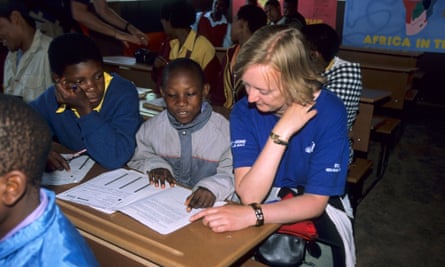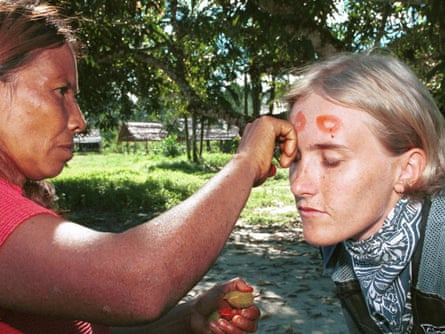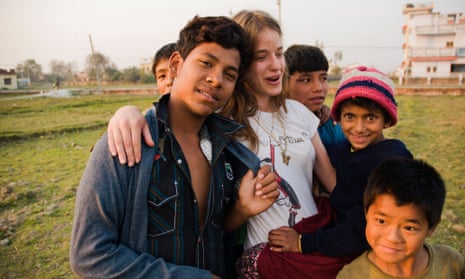As many volunteers set off this summer to experience what it's really like working in the development sector, some for the first time, we asked current and former volunteers, recruiters and NGO directors for their tips on how volunteers and interns can leave a lasting impact.
1. Ask questions
“Ask lots of questions,” says Katherine McGregor, an international development student from Ontario, Canada who is volunteering in Ghana for the World University Service of Canada.
“Even if it’s something you’ve studied in school, you’ve probably never seen it implemented ‘on the ground’ so ask how that process works so that you can bridge your academic theory with practical application.”
2. Speak to the volunteer who was there before you
Emma Baker, volunteering in Uganda, says doing pre-flight research on how your organisation fits within the wider context of the country you are visiting will “save you time” and “allows you to concentrate on how you personally can fit in and add value”. Arrange a chat with your predecessor to get a better sense of the workload you’ll be picking up.
3. Set clear goals
Discuss your ambitions with your organisation and how you both can get the most out of your placement. “Volunteers often have more power and choice than they realise,” Baker says.

4. Never say no to an opportunity
Trivial tasks can allow you to see an organisation from all angles. “Often you can make an impact in areas that you least expect, such as English language and IT skills,” Baker says.
5. Work as a team
For Eleanor Paton, recruitment and marketing manager at CWF Cambodia, it’s not just about the individual contribution you bring:
“Team players really stand out on our programme – your managers will want to keep on someone who is committed to the project’s overall aims.”
J, a humanitarian worker for over 20 years, adds that inexperienced volunteers should not get cocky.
6. Be flexibile
Situations change quickly, McGregor says. Being flexible and having a good sense of humour will go a long way. Put the programme's needs before personal feelings.
7. Ask what your organisation needs
“My recommendation to volunteers that want to create impact is to ask your organisation what problems they have,” Paton says. Use your team to bounce ideas off and accept constructive criticism.
“Often volunteers are operating in a new socio-economic/cultural context and so won’t automatically know what is and isn’t feasible.”
8. Be useful
Where you can make the most difference may not be immediately obvious, Baker says. As someone with teaching experience, you might be more useful helping with lesson plans or re-structuring the curriculum than teaching.
9. Pick up the basics of the language
Nilofar Ansher, from the Global Initiative for Inclusive ICTs in Mumbai, India, suggests considering how you can communicate with a non-English speaking community before you go.
10. Respect the local culture
Respect cultural norms and your organisation's policies – not doing so, Paton says, is the worst trait in a volunteer.
"Practically, things like dress code for women (ie no skirts/dresses/shorts above the knee) and other cultural faux-pas are areas I wish I'd been more prepared for,” Baker adds.

11. Learn from your mistakes
“[In the past] I’ve kept quiet when I felt uncomfortable about something. The cultural differences mean that sometimes things can get lost in translation," Baker says. “But when I realised that asking difficult questions doesn't usually cause offence, I just spoke openly about them to people around me.”
12. Curtail your righteous indignation
McGregor says knowing why you’re volunteering is important, but “don’t go to prove you can ‘change the world’, volunteer to learn how you can make a positive impact as a future development professional”.
13. Be organised
Build reflection into your daily routine as a log of challenges and lessons learned will help with preparation for future job interviews.
14. Build local and global networks
Linking your project to a similar one in your home country is another way to ensure your contribution lives on, Baker says.
Ravi Solanki, executive committee member at Cambridge Development Initiative, also suggests creating a network for volunteers to keep in touch with the project's development. “Our volunteers have started an alumni impact system," he says.
15. Be sociable and make contacts
“Volunteer to participate in networking events – I represented my environmental NGO at a national conservation conference and made lots of connections, one of which I followed up later and managed to secure a paid internship.”
Any tips on making a lasting impact as a volunteer we've missed? Share them below.
Read more stories like this:
Interning at the UN: why I left my family for New York City
Volunteer placements in development: 10 ways to make them count
Volunteering in international development: how to do it well
Join the community of global development professionals and experts. Become a GDPN member to get more stories like this direct to your inbox

Comments (…)
Sign in or create your Guardian account to join the discussion